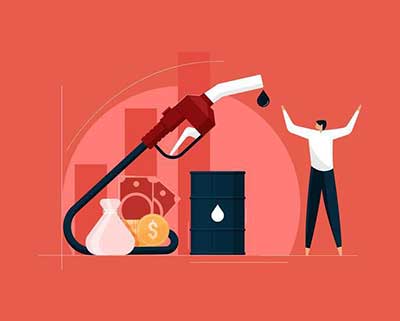Relevance: GS-3: Indian Economy and issues relating to planning, mobilization, of resources, growth, development and employment.
Key Phrases: Levy value-added tax, hybrid model, excise duty, special excise duty, additional excise duty, flat charge, surcharge.
Why in News?
- Prime minister's recent remark where he named some opposition ruled states and asked them to bring down taxes on petrol-diesel have expectedly created a political controversy.
- As international crude oil prices rose from the last quarter of 2021, pressure began to build on the centre to lower taxes on fuel and provide relief to consumers.
Complications in Fuel Taxation
- It is quite complicated. The final retail price of petrol and diesel purchased at a petrol pump has multiple components. The base price of the auto fuel, including the freight, accounts for 56 per cent of the final selling price for petrol and 60 per cent for diesel.
- The Centre charges excise duty on the base price accounting for 26 per cent and 23 per cent of the final price of petrol and diesel, respectively.
- The excise duty is charged at a fixed rate per litre and has various components (discussed below). The dealer’s commission amounts to another 4 and 3 per cent of the selling price of the two petroleum products.
- The States levy value-added tax (VAT) on the cost of petrol and diesel, including excise duty and dealer’s commission. Now, States have been given a free hand in structuring and taxing fuel in their States.
- Many States/UTs such as Arunachal Pradesh, Delhi, Odisha and Telangana charge just VAT at a certain rate applied to the cost of the petrol. Since VAT is an ad-valorem tax, it will go up and down with the market price of the fuel.
- Many States have tried to address the resulting volatility in tax collection by adopting a hybrid model wherein they charge a lower VAT on the fuel and apply a flat charge per litre of petrol and diesel.
Do you Know?
- Cess: Cess is a tax charged over the basic tax liability, and
it is levied for a particular purpose, such as education cess,
infrastructure development cess etc.
- The cess collected has to be spent only for a specific purpose, the Centre need not share the collection with States.
- Surcharge: A surcharge is an extra fee, charge, or tax that
is added on to the cost of a good or service, beyond the initially
quoted price.
- Often, a surcharge is added to an existing tax and is not included in the stated price of the good or service.
Recent Row Over the Prime Minister’s Remarks on Fuel Taxes
- The Centre cut central excise duty by ₹5 on petrol and ₹10 on diesel last November. It also asked States and Union Territories to follow suit by reducing their taxes. The many States complied with the Centre’s diktat.
- Uttar Pradesh, Gujarat, Karnataka, Haryana, Madhya Pradesh and Goa reduced the State tax on petrol by ₹7 per litre. Punjab made the largest cut, slashing petrol taxes by ₹10 and diesel tax by ₹5 per litre.
- The States such as Bihar (₹3.2), Himachal Pradesh (₹2) and Odisha (₹3) made minor cursory cuts. The Prime Minister is now admonishing the opposition ruled States for not reducing fuel taxes.
Concerns of States Against Centre Levying Cess on Fuel
- If we look at the excise duty charged by the Centre, it comprises four elements — basic excise duty, special excise duty, additional excise duty (road and infrastructure cess) and agriculture and infrastructure development cess.
- The Centre has to share only the amount collected under basic excise duty with States as other components are either cesses or bucketed under surcharge.
- Basic excise duty accounts for just 4.2 per cent of the amount collected by the Centre as fuel taxes.
- The States are pointing out that the Centre needs to forego its revenue by cutting its fuel taxes further before asking them to do so.
- Centre keeping the larger share: States are also not happy with how the Centre is using the cess and surcharge on fuel taxes to keep a larger portion of taxes with itself.
- Effect of Pandemic: States also think that the Centre is being unfair in asking them to forego revenue from an important source when the economy is still grappling with the effects of the pandemic. Taxes on fuel and alcohol form an important part of States’ own tax revenue.
Way Forward:
- Bringing fuel under GST will be the right way to resolve the issue and will help in multiple ways.
- One, it will ensure that consumers across the country pay the same rate of taxes.
- Two, the Centre will have to give States their rightful share of taxes collected as the complicated central tax structure will go under GST.
- Three, tax rates on fuel may come down once it moves under GST. The current tax rate on petrol and diesel (Centre and States combined) amounts to a whopping 75 per cent, much above the higher GST slab applied for sin goods.
Sources: The Hindu BL
Mains Question:
Q. Discuss why are States against Centre levying cess on fuel? What are reasons for rising fuel prices? (250 words).








